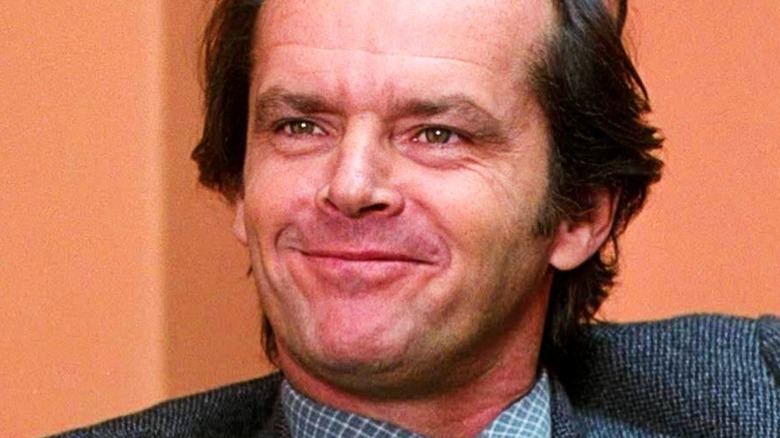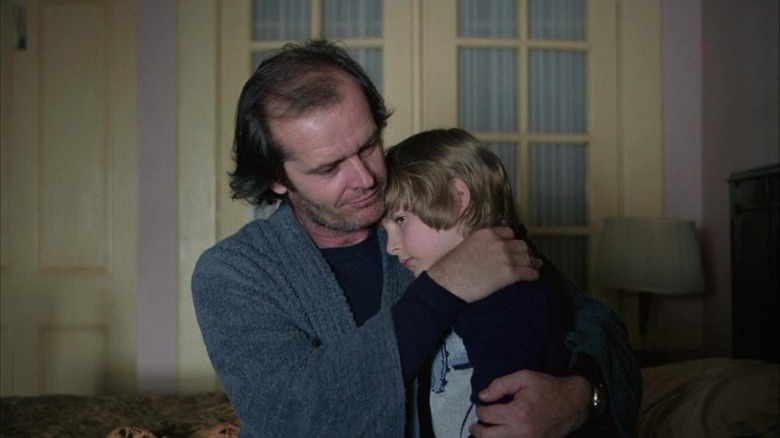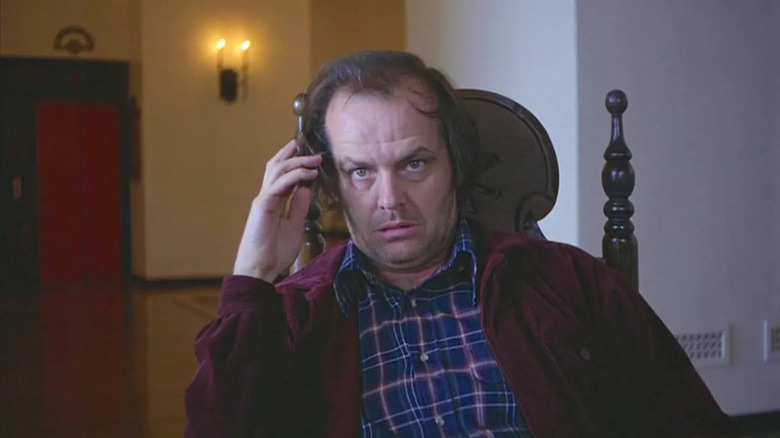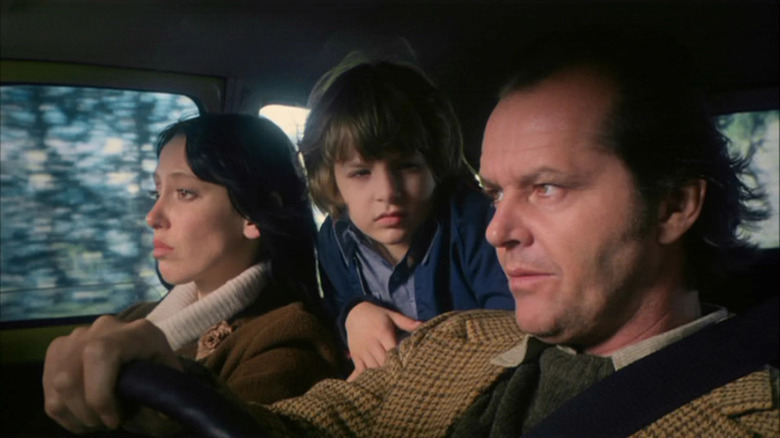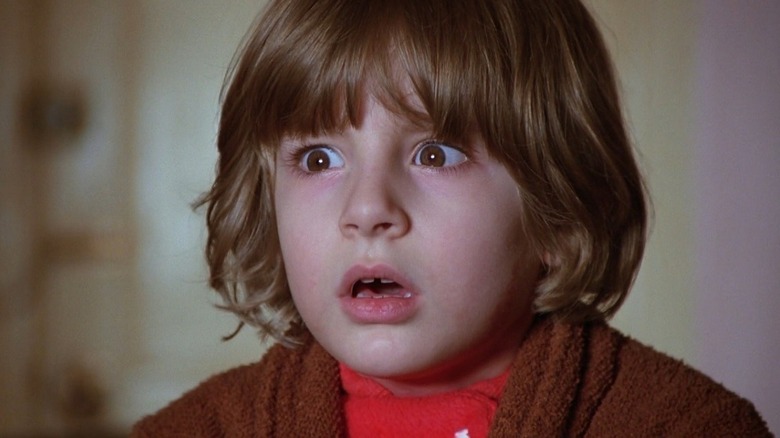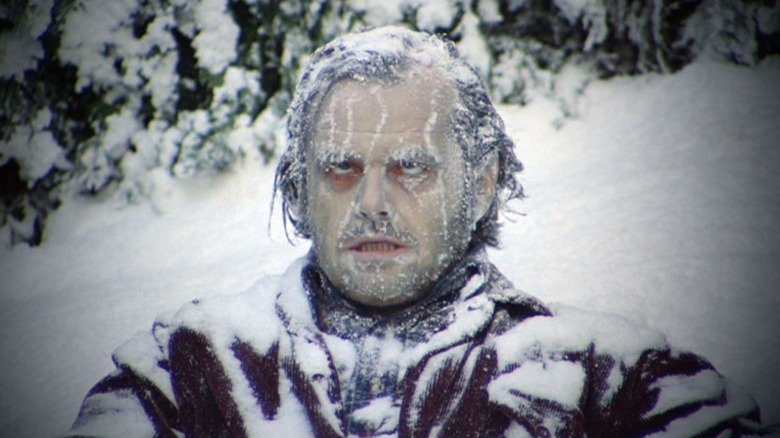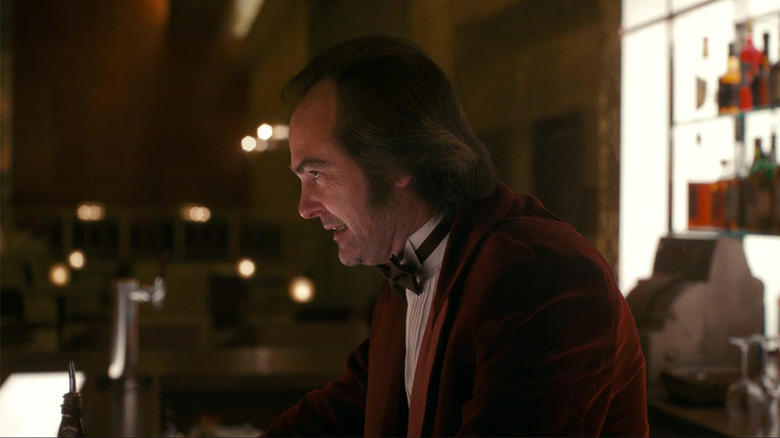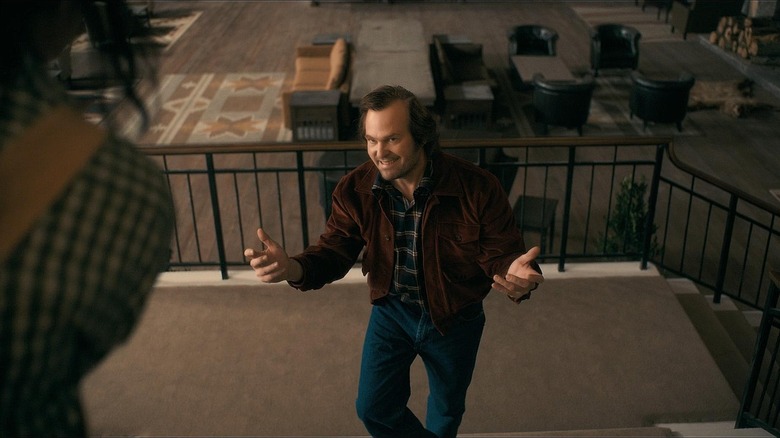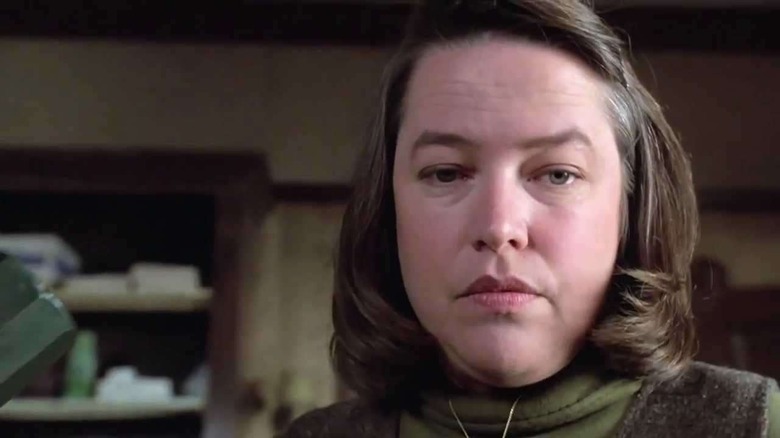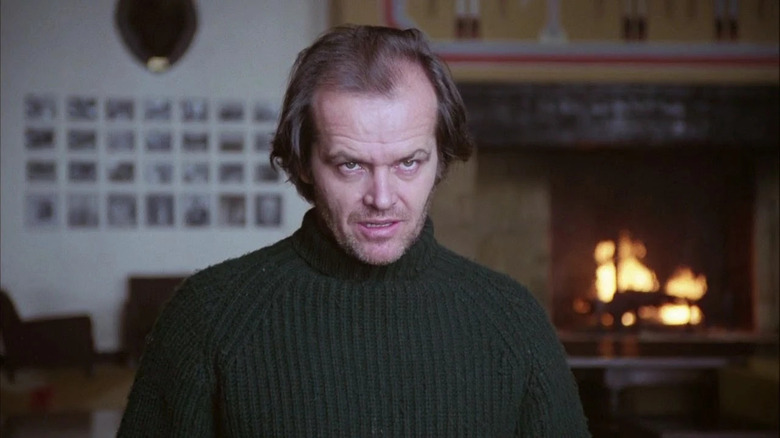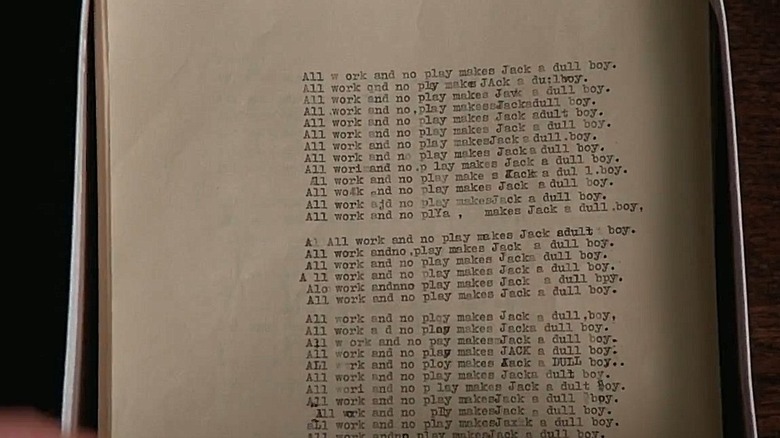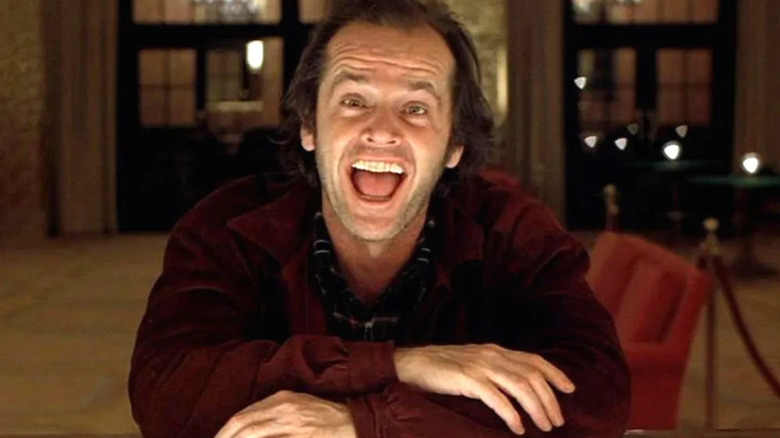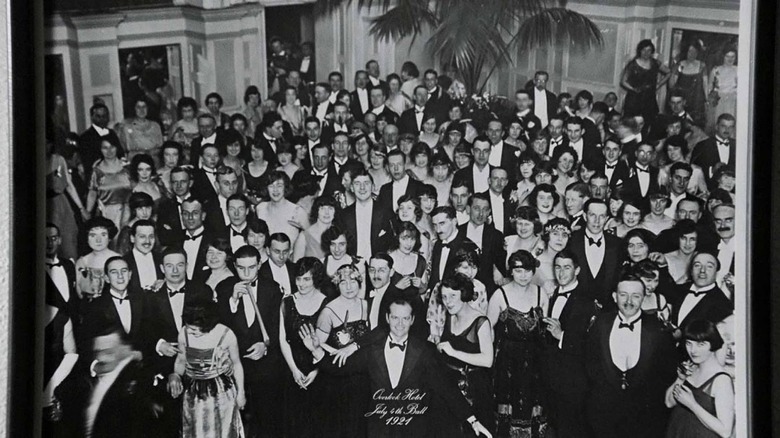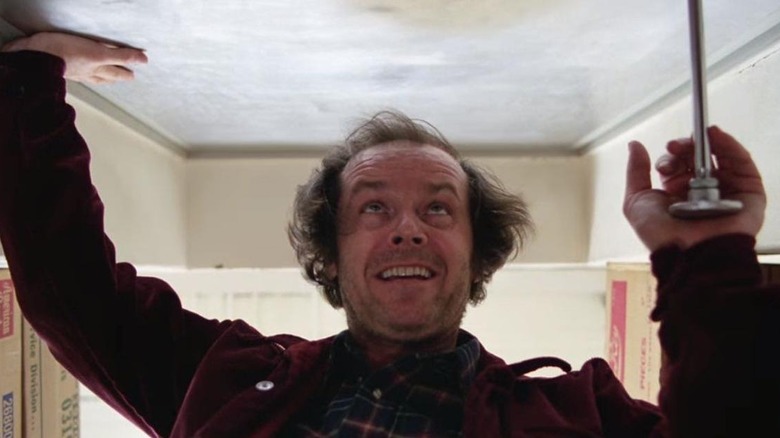The Dark History Of Jack Torrance From The Shining
Before Stanley Kubrick turned it into a legendary psychological horror film in 1980, "The Shining" was a novel by prolific horror author Stephen King, first published in 1977. The book and the movie both bring focus to the world of protagonist Jack Torrance, a writer attempting to piece his life back together after a bout with alcoholism. The famed setting of the Overlook Hotel is an isolated, beautiful piece of architecture hidden in the fortress of the Colorado Rockies, where spirits roam and influence the caretakers who are elected to hold court over the premises in the off-season.
"The Shining" has endured prominently in popular culture over the decades, with Kubrick's film, with Jack Nicholson giving an unforgettable performance as Torrance, being the most revered manifestation. However, ABC made a miniseries based on King's book in 1997, and the acclaimed author prefers that iteration over the original, telling the New York Times that Rebecca De Mornay's performance as Wendy Torrance, Jack's wife, is "the real reason I love that mini-series."
When Jack goes berserk, he tries to murder Wendy and their son Danny, chasing them throughout the sprawling hotel in the process. He meets his demise, but not before carrying out a menacing final act that colors his vengeful pursuit. Jack was ranked as the 25th greatest villain by the American Film Institute, but King never truly envisioned the character as a villain. Though he has a shaky past, King's Jack remains a dynamic figure who wants to be a family man and avoid falling into the cycle that hurt his own father. Let's take a look at the dark, and often complicated, history of the character of Jack Torrance.
Jack's troubled childhood
There's that one saying, "hurt people hurt people," and it can definitely be attributed to Jack Torrance in "The Shining." In King's novel, there's a flashback sequence that aims to give some backstory to its protagonist. The pages in question depict Jack's upbringing, as readers learn that his father was an abusive alcoholic in his own right and, at one point, hurt Jack's mother by beating her with a cane. He spent years watching as his mother lied to hospital officials about the source of her injuries, claiming it was a fall and not the hands of her own husband.
King has written plenty of complicated and dynamic women in his books, like Carrie White, Annie Wilkes, and Beverly Marsh, but Jack's mother is voiceless in "The Shining." That decision by King could ultimately be deliberate, maybe an extension of Jack's own trauma being told from a third-person point-of-view.
In Kubrick's adaptation, most of Jack's backstory is omitted. Perhaps that was done to make his descent into mania more of a terrifying depiction of violence and less an exploration into how trauma impacts the psyche of adults who were children of abuse. Nonetheless, Jack's childhood was one of immense pain and grief, most of it not so easily forgettable.
Jack's alcoholism
An early scene in Kubrick's adaptation finds Wendy Torrance (Shelley Duvall) telling a doctor that Jack had previously dislocated their son Danny's (Danny Lloyd) shoulder in a stupor of drunken rage. It was that moment when Jack decided to quit drinking cold turkey and, up until the events of the story, he's stayed true on his path of sobriety.
In King's novel we also learn that Wendy was prepared to leave Jack for what he did to their son, but what causes him to quit drinking is a drunk driving accident during which he and a drinking buddy ran over an abandoned bike that was left in the road. The adaptation of these details for Kubrick's film keep the drama focused on the Torrance family, bringing more empathy to Jack by having him specifically choose his own son over a dangerous relationship with alcohol. It's interesting, then, to note that the movie seems to do more to foreshadow a chance for redemption, given that Kubrick drops the last-minute regret that Jack shows in the climax of the book.
Another incident established by the book involves Jack, while teaching at Stovington Preparatory School, assaulting a student who vandalized Jack's car. That incident is nixed from Kubrick's script, as the film focuses solely on Jack's writing career rather than exploring his teaching job.
When Jack was a professor, he had an affair
In neither King nor Kubrick's version of "The Shining" do we get any sort of hint about the repercussions from Jack's tenure as a teacher at Stovington. 36 years after publishing his novel, King elected to write a sequel to the horror classic. In "Doctor Sleep," King catches up with Danny in adulthood, depicting his work as a hospice nurse who has now fallen into the same habits of alcoholism that his father struggled with. Jack is primarily absent in the novel, but we do learn that Danny has a half-sister named Lucy Stone.
Lucy was the product of an affair that Jack had at Stovington before his firing when, at a party, he had sex with Sandy Reynolds, a student teacher. Danny, who has telepathic "shining" abilities like the Overlook Hotel's former head chef Dick Hallorann, discovers that Lucy, too, shines, but at an even stronger magnitude than him. At the end of "Doctor Sleep," Danny, Lucy, and her daughter Abra, along with Jack's ghost, defeat the True Knot, a group of vampires who own the business that is set to be built over the remains of the now-demolished Overlook Hotel.
In the book, Danny tries to save Jack
One complaint that can be made about Kubrick's adaptation of King's novel is how little focus Danny's psychic abilities receive. Coined "shining" by Dick Hallorann (Scatman Crothers), the Overlook Hotel's chef, Danny has the ability to telepathically connect with everyone else who shines, including Hallorann. It's explained to Jack by the ghost of caretaker Delbert Grady (Philip Stone). "Your son has a very great talent," Grady says. "I don't think you are aware how great it is."
Danny's shining is guided by "Tony," a supernatural figure who Danny claims lives in his mouth, and in the film we see disturbing visions of death and looming chaos being revealed to Danny by Tony. Many of Danny's visions include depictions of the spirits who lurk the Overlook's property, specifically Grady's iconic twin daughters, the word "murder" spelled backwards, and a deteriorating old woman who tries choking him. That incident of choking is effectively blamed on Jack by Wendy.
In the film, as Jack increasingly gives in to rage under the influence of the hotel, it's implied that Hallorann can sense that Danny is in danger. In the book, however, Danny uses his shining deliberately to call Hallorann for help, and later, to save his father from the spirits that are overpowering his psyche.
In the book, Jack dies more heroically
The greatest difference between the novel and the film is what becomes of Jack near the end of "The Shining." In Kubrick's version, he goes on a violent, menacing rampage in an effort to kill his family, just as Grady suggested he do, before freezing to death in the frigid snow covering the Overlook's hedge maze.
In the book, after he fails to murder Wendy and Hallorann but wounds both of them, Jack finds Danny and attacks him. When his father tries killing him, Danny uses his powers to conjure the paternal love to the forefront of his psyche, which overpowers whatever evil spirit is possessing him. Jack allows his son to escape the hotel before voluntarily setting off a boiler explosion and dying in the process.
The change in Jack's death is most likely to fully push the character into villain territory, but there's a sense of depth and nuance in King's version that's absent from Kubrick's. But then again, maybe that was fully the point. Each version works, thankfully, in their respective circumstances.
Jack returns in Doctor Sleep as a ghost
It's no surprise that Jack is not a central figure in "Doctor Sleep," given his ultimate demise in "The Shining," but his spirit remains with his son Danny. In King's sequel novel, the site of the Overlook Hotel has become a campground owned by the vampiric True Knots. The True Knots feed on "shining" children so they can rid the world of them and consume their otherworldly powers. When Dan, Lucy, and Abra get into a final showdown with True Knot leader Rose the Hat, Jack's ghost helps his son and his family defeat the vampires before they can take over the Overlook forever.
Though "Doctor Sleep" is Danny's story, it is there, at its end, that he and his father's spirit are able to reconcile with one another and find closure. Before his death, the good person and loving father within Jack had re-emerged before he destroyed the Overlook in the boiler room explosion. We also get a reappearance of Jack when Danny learns about his half-sister Lucy, who also shines.
In the Doctor Sleep movie, Jack replaces Lloyd
One of the most infamous pre-climax scenes in "The Shining" is when Jack, flirting with the onset of his psychotic break, meanders into the Overlook's vacant Gold Room lounge. There, at the bar, he meets Lloyd (Joe Turkel), a bartender spirit who lures Jack back into his drinking habits. Whether or not the drink Jack consumes is merely a figment of his imagination is open for interpretation, as whatever (or whomever) haunts his psyche is surely more powerful than any drink could ever be. Lloyd is quickly the catalyst for other Overlook spirits, like Grady, who tempt Jack into wrongdoings, including the attempted murder of Wendy and Danny.
In Mike Flanagan's film adaptation of "Doctor Sleep," Jack (Henry Thomas) appears as a figment of Dan's (Ewan McGregor) own imagination, as he is now the bartender of the Gold Room. Initially, Jack tells his son that he is not his father but a bartender named Lloyd. "I think you've mistaken me for someone else. I'm just a bartender," Jack tells his son. In "The Shining," Jack accused Lloyd of knowing more than he let on. In "Doctor Sleep," Dan is in the same seat and drinking the same Jack Daniels his father once had, before temptation led him down an irredeemable path. Fortunately for Dan, his fate is much less unsettling.
Jack exists in the universe of Stephen King's Misery
Stephen King's writing career is so prolific that it's no surprise how often the protagonists and events of his novels often intersect and interact with each other. He's created a Stephen King Multiverse within his own body of work. Most of King's characters come home to roost in his "Dark Tower" series, but sometimes, they appear elsewhere in his bibliography. Dick Hallorann appears in "The Shining" and later in "It," Beverly Marsh is a central figure in "IT" and then has a cameo in "11/22/63," and the interdimensional being known in "IT" as Pennywise reappears in "Dreamcatcher" and "The Tommyknockers," to name a few.
Jack Torrance is a part of that elite company, even if not visually. He is merely mentioned in "Misery" Chapter 24, when antagonist Annie Wilkes makes a mention of the Overlook Hotel to protagonist Paul Sheldon. She notes that it was burned down by a man, who we know was Jack Torrance. "Misery" was written after Kubrick's film adaptation came out, but King, who notoriously disliked Kubrick's vision (via The New York Times), made the decision to allude to his own version of "The Shining's" ending, in which Jack blows up the hotel with an explosion in the boiler room in order to save his son and wife. Torrance's inclusion in "Misery," albeit not directly by name, is a cool nugget for hardcore Stephen King fans and one of the author's cleverest. A world that Annie Wilkes and Jack Torrance both exist in is a terrifying one.
Jack might have also possessed the shining
One of the most brilliant aspects of "The Shining" is how both the novel and the film leave much room for interpretation by readers and audiences. Kubrick's adaptation, specifically, has long been the subject of great discussion. Fans and critics have debated over its symbolism, its ending, and all of its many small details.
One of the more understated theories is that Jack, too, possessed the "shining." Given that both Danny and his half-sister Lucy can shine, it wouldn't be out of the question to assume that Jack could, too. Whether or not telepathic psychic abilities are genetic is an unanswerable question, but the fact that Lucy's daughter Abra has inherited powers makes it very plausible. The idea is that, because of the abuse he and his mother suffered at the hands of his father, Jack's abilities were suppressed deep within. Trauma has a way of submerging certain parts of someone's psyche far enough beneath the surface of their subconscious that they forget it exists altogether.
It's possible that Jack shined once, as a kid, but no longer remembers it by the time the events of "The Shining" occur. That would explain why Danny is not able to communicate telepathically with his father, but it's a theory that'll likely never be explained or answered by King himself. It's an idea that would make a lot of sense, though, especially in how the Torrance-Stone bloodline is brimming with shiners.
Jack wasn't a dull boy in the novel
The famous line written repeatedly on the pages stacked beside Jack's typewriter, "All work and no play makes Jack a dull boy," existed before "The Shining" was even a thought in Stephen King's mind. Originated by 17th century historian James Howell, the saying first appeared in his 1659 book "Proverbs" (via Book Browse). Its meaning has become menacing in modern times, thanks to its inclusion in the film adaptation of "The Shining."
The line didn't appear in Stephen King's novel, though, nor did the plot point of Jack's writer's block play as a large factor in his descent into psychosis. Instead, Jack discovers a scrapbook about the Overlook's history in the boiler room of the hotel and is inspired to write his novel. It's that scrapbook, too, that is a part of the communion of spirits haunting him as his psyche plummets. That part of King's novel is omitted from Kubrick's film, likely because it would detract from the filmmaker's overarching thesis of what might drive an isolated man to the brink.
It's still unclear what pushed Jack over the brink
The true reason for Jack's psychotic breakdown is never fully revealed in "The Shining." King's book goes into some detail about how the Overlook's spirits, supposedly, infiltrate Jack's subconscious, but Kubrick's film leaves even more room for interpretation about what actually occurred during that fateful winter. King's focus on the ghosts of the Overlook renders one conclusion, while Kubrick's leaning into the detriments of hyper-isolation and seclusion renders another.
Kubrick's terrifying visuals, with flickers of gushing blood filling the hotel hallways and the looming specters of Grady's dead daughters, lend a helping hand to the debate, whereas King's novel, working with the imagery of written word, picks a lane and pursues it full-stop. The movie swirls a cocktail of motives, with immense cabin fever and writer's block serving as a pressure cooker for issues of self-doubt and misogyny. Of course, the screenplay from Kubrick and co-writer Diane Johnson isn't interested in spelling out its morals, which is what makes "The Shining" so frustratingly and captivatingly unsettling. Audiences are tasked with decoding whether or not Lloyd, Grady, and the woman in Room 237 were figments of Jack's deteriorating imagination, or something much more sinister and real.
At the film's end, Jack appears in an old photograph from 1921
Some of the greatest debates revolving around Kubrick's movie surround its final shot, where we get a close-up of a photograph. That picture, hanging on a wall surrounded by numerous hotel memories from over the years, features Jack front and center, enjoying the spotlight in a room crowded with partying guests. The kicker, though, is that the picture is dated July 4, 1921. As far as audiences know, Jack was a father and writer aged 40-ish, not an elderly man who was, somehow, at the Overlook 60 years before the events of the movie take place.
But, if you scale back before the climax of the film hits, there's the infamous line from Grady: "You've always been the caretaker. I should know, sir. I've always been here." It's the first suggestion that the spirits of the Overlook have fully taken over Jack's psyche. There is a line blurred when Grady then tells Jack that he must "correct" Danny's powers by killing him and Wendy, suggesting that he is still living in the present, but that is what makes the debate over the ending's meaning so limitless. Was Jack a spirit living two lives, one at the Overlook and one with Wendy and Danny, at the same time? Is he a reincarnation of a figure from the hotel's bloody past? Has his death somehow subsumed him into its history? There's no single correct answer, but it's rich with potential interpretations.
Jack is the only Stephen King character to be a protagonist and an antagonist
Stephen King infuses great depth into his characters, even with how prolific he remains and how expansive his bibliography is. The human villains, like Margaret White, Henry Bowers, and Ace Merrill, who populate his stories are rich and thoughtfully layered. Even Annie Wilkes' insidious evil is balanced with a good backstory. Jack Torrance being in similar company should come as no surprise. In fact, Jack is the only King character to serve as both protagonist and antagonist.
In Kubrick's film, he's primarily a villain rendered as an irredeemably abusive father. He's a man who is possessed or is having a breakdown because of cabin fever, electing to murder his wife and child in the process. However, King's vision for Jack is much more nuanced. He bestows compassion into his leading man by giving us a glimpse into Jack's troubled past and showing us how that trauma informs his adulthood. When Danny attempts to save his father at the novel's end, Jack snaps back into the man he once was, briefly, and allows his son to escape. He knows the only way Danny and Wendy can be free is if he destroys the Overlook, which means he must destroy himself.
That kind of empathy, no matter how far below the surface it remains, would have changed the composite of Jack in Kubrick's adaptation. King's Jack is his own worst enemy, his terrifying potential given an (almost) heroic arc. It's safe to say that, in the book version, Jack is not the villain as much as he is a vessel for the hotel's own sinister agendas. In the movie, he's a particular kind of unrelenting menace. Few characters have ever been so dynamic on-screen and on the page.
